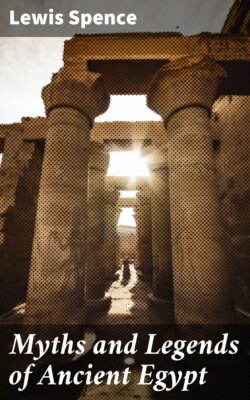Читать книгу Myths and Legends of Ancient Egypt - Lewis Spence - Страница 6
На сайте Литреса книга снята с продажи.
Local Gods
ОглавлениеAnother cause which made for confusion was that in every large town of Upper and Lower Egypt and its neighbourhood religion took what might almost be called a local form. Thus the great gods of the country were known by different names in each nome or province, their ritual was distinctive, and even the legends of their origin and adventures assumed a different shape. Many of the great cities, too, possessed special gods of their own, and to these were often added the attributes of one or more of the greater and more popular forms of godhead. The faith of the city that was the royal residence became the religion par excellence of the entire kingdom, its temple became the Mecca of all good Egyptians, and its god was, so long as these conditions obtained, the Jupiter of the Egyptian pantheon. It might have been expected that when Egypt attained a uniformity of culture, art, and nationhood, her religion, as in the case of other peoples, would also become uniform and simplified. But such a consummation was never achieved. Even foreign intercourse failed almost entirely to break down the religious conservatism of priesthood and people. Indeed, the people may be said to have proved themselves more conservative than the priests. Alterations in religious policy, differentiation in legend and hieratic texts emanated from time to time from the various colleges of priests, or from that fount of religion, the sovereign himself; but never was a change made in deference to the popular clamour unless it was a reversion to an older type. Indeed, as the dynasties advance we behold the spectacle of a theological gulf growing betwixt priests and people, the former becoming more idealistic and the latter remaining as true to the outer semblance of things, the symbolic, as of old.
The evolution of religion in ancient Egypt must have taken the same course as among other races, and any hypothesis which attempts to explain it otherwise is almost certainly doomed to non-success. Of late years many works by learned Egyptologists have been published which purport to supply a more or less wide survey of Egyptian mythology and to unravel its deeper significances. The authors of some of these works, however admirable they may be as archæologists or as translators of hieroglyphic texts, are for the most part but poorly equipped to grapple with mythological difficulties. To ensure success in mythological elucidation a special training is necessary, and a prolonged familiarity with the phenomena of early religion in its many and diverse forms is a first essential. In the work of one foreign Egyptologist of standing, for example, a candid confession is made of ignorance regarding mythological processes. He claims to present the "Egyptian religion as it appears to an unprejudiced observer who knows nothing of the modern science of religions." Another Egyptologist of the first rank writes upon the subject of totemism in the most elementary manner, and puts forward the claim that such a system never existed in the Nile valley. But these questions will be dealt with in their proper places.
Beginning with forms of the lower cultus—forms almost certainly of African origin—the older religion of Egypt persisted strongly up to the time of the Hyksos period, after which time the official religion of the country may be found in one or other form of sun-worship. That is to say, all the principal deities of the country were at some time amalgamated or identified with the central idea of a sun-god.
The Egyptian religion of the Middle and Late Kingdoms was as much a thing of philosophic invention as later Greek myth, only, so far as we have the means of judging, it was not nearly so artistic or successful. For, whereas we find numerous allusions in the texts to definite myths, we seldom find in Egyptian literature the myths themselves. Indeed, our chief repository of Egyptian religious tales is the De Iside et Osiride of the Greek Plutarch—an uncertain authority. It is presumed that the myths were so well known popularly that to write them down for the use of such a highly religious people as the Egyptians would have been a work of supererogation. The loss to posterity, however, is immeasurable, and, lacking a full chronicle of the deeds of the gods of Egypt, we can only grope through textual and allied matter for scraps of intelligence which, when pieced together, present anything but an appearance of solidity and comprehensiveness.
